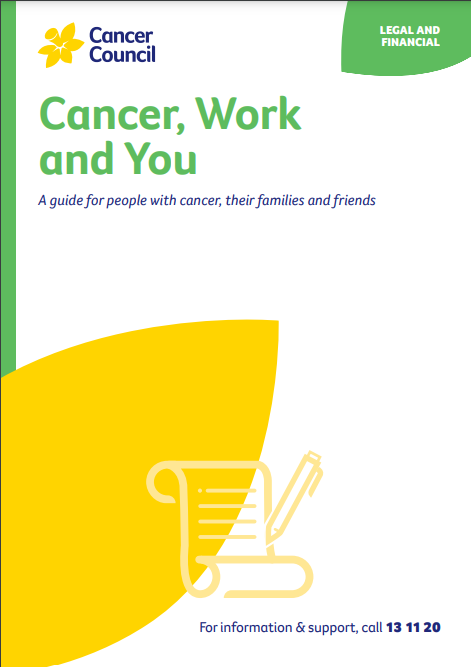- Home
- About Cancer
- Coping with a diagnosis
- Cancer, work and you
- For workers
- Returning to work
- Going back to work
Going back to work
You may be worried about how your employer and co-workers will react, and if there will be questions about your ability to perform your usual role. You may think about returning to work gradually, increasing your hours and duties as you become stronger, or you may feel ready to resume your old workload right away.
Learn more about:
- Overview
- Making a return to work plan
- Changing jobs
- Preparing for a job interview
- Finding a new job
- Telling a potential employer
- Other options
Overview
All employers are legally required to make changes (known as reasonable adjustments) to accommodate the effects of an employee’s cancer diagnosis (see Flexible ways of working).
This may mean, for example, that your employer allows you to return to work in stages, is flexible with start and finish times, gives you time off to attend medical appointments, or provides ergonomic work tools.
Getting medical advice about work capacity
Ask your GP, cancer specialist or an occupational physician about whether you are able to undertake your usual tasks. They may ask for an assessment of your function by an occupational therapist to help make a decision.
Medical assessments and your rights
Your employer can ask for a medical examination to show you are fit for work or to identify any changes they need to make to accommodate your needs. However, an employer doesn’t have the right to request full unrestricted access to your medical records.
When you can’t return to your previous role
If you are unable to carry out your previous role, your employer may offer a program to train you for another role. Your employer only has a duty to offer you a different role if the cancer is work-related. Learn more about work-related cancers.
Support programs to help you stay employed
Work Assist is a free government program. It helps people in danger of losing their job because of illness, injury or disability to stay with their current employer. Call 1800 464 800 or visit jobaccess.gov.au for more information. If you have life insurance or income protection insurance, check if it includes rehabilitation cover to help you return to work.
Download our fact sheet on Insurance and cancer.
→ READ MORE: Making a return to work plan
At the time of the diagnosis, I was working as an office manager, but afterwards we reassessed our life. I changed jobs and we moved house. I now work in aged care, which I love.
Jodie
More resources
Brooke Russell, Principal Occupational Therapist, WA Cancer Occupational Therapy, WA; Bianca Alessi, 13 11 20 Consultant, Cancer Council SA; Dr Prunella Blinman, Medical Oncologist, Concord Cancer Centre, Concord Repatriation General Hospital, NSW; James Chirgwin, Physiotherapist, The Wesley Hospital, QLD; Danielle Curnoe, Consumer; Simon Gates, Barrister, Tasmanian Bar, TAS; Justin Hargreaves, Medical Oncology Nurse Practitioner, Bendigo Health Cancer Centre, VIC; Kaylene Jacques, Director, People and Communications, Cancer Council NSW; Alex Kelly, Senior People Attraction Advisor, Human Resources, Allianz Australia Insurance, NSW; Legal reviewer; Georgina Lohse, Social Worker, GV Health, VIC; Lesley McQuire, Consumer, Cancer Voices NSW.
View the Cancer Council NSW editorial policy.
View all publications or call 13 11 20 for free printed copies.

